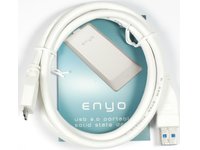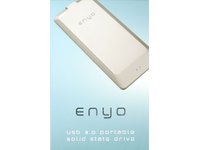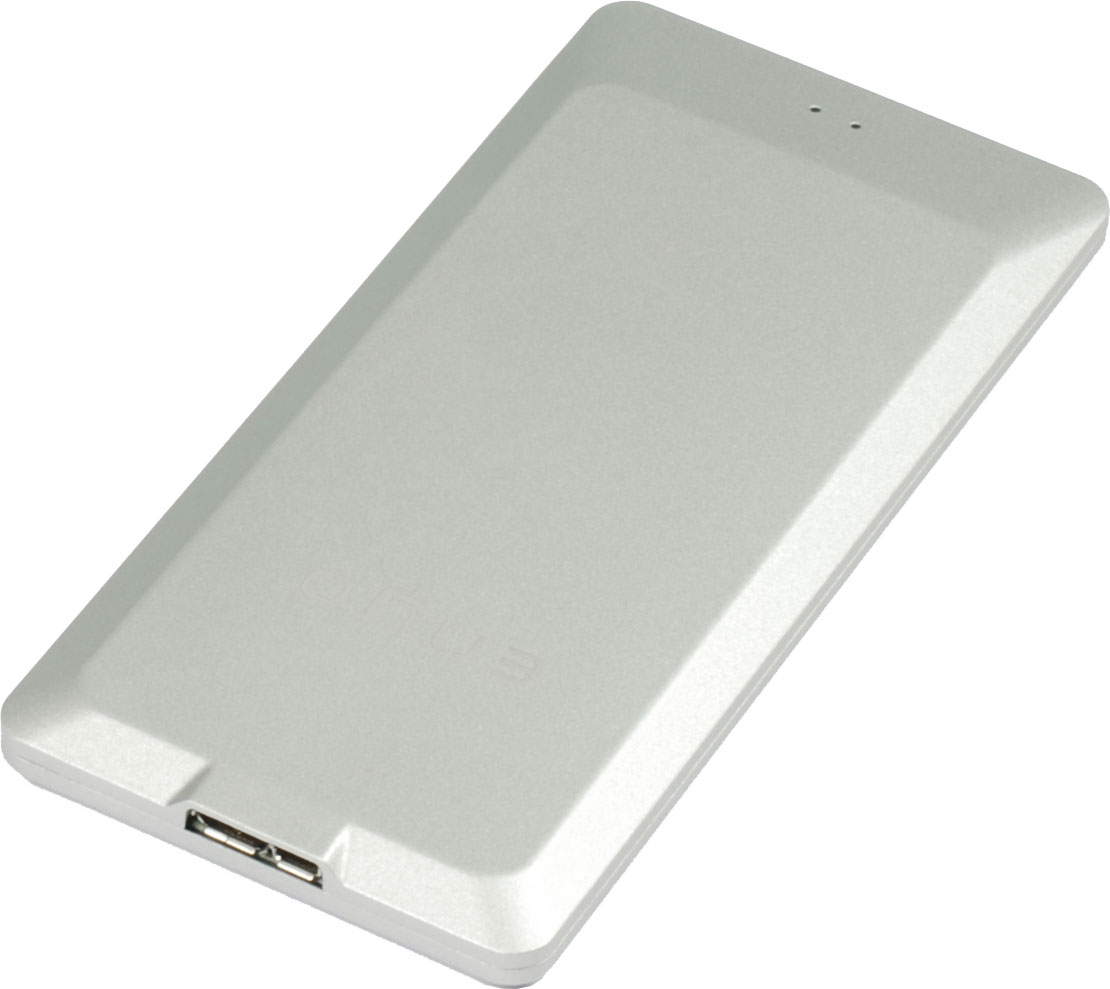Nine USB 3.0 Flash Drives For Road Warriors
The best ultra-portable USB 3.0 storage products from 16 to 128 GB square off in a grand comparison. We found wildly disparate transfer rates ranging from 200 MB/s down to a snail’s pace. At the end, though, two products rose to the top of our list.
OCZ Enyo (128 GB)
The Enyo is not a conventional USB thumb drive, but rather a very compact portable drive, flash-based and with a USB 3.0 interface. This provides a larger footprint for flash memory chips, so that capacity is significantly higher than what you'd expect from classic thumb drives. We tested a 128 GB model; the Enyo is also available in 64 and 256 GB capacities. OCZ offers a three-year warranty.
The housing is made of aluminum, with a USB port on one end and a status LED on the other, which illuminates when the device is accessing data. With a specified 2.4 W power consumption, it is considerably more energy-efficient than hard drives, but it also requires more power than USB thumb drives. Those who use their notebooks away from a wall socket should probably only use the Enyo when necessary.
The 128 and 256 GB models offer read speeds up to 260 MB/s and write rates of up to 200 MB/s, according to OCZ. The 64 GB variant is a little slower. The company also promises sustained writes up to 150 MB/s. Our test returned a read speed of almost 200 MB/s and a write rate of up to 189 MB/s. The minimum transfer rate, according to h2benchw, was 169 MB/s, supporting OCZ’s claims.
In our real-life tests the Enyo performed very well. Only when reading small files did it provide a relatively low overall transfer rate. In the combined reading and write test, the Enyo got outperformed by Kingston's HyperX Max 3.0 and LaCie's FastKey, but it was the top performer in all other categories. Together with the FastKey, the Enyo is the only USB 3.0 drive to offer strong I/O performance.
This drive's price corresponds to its strong performance: $175 for the 64 GB model and $280 for 128 GB gives us an idea of what you might have to fork over for the 256 GB model.
The Enyo’s solid performance profile, especially when writing, is the main reason for us to grant OCZ's drive our Recommended Buy award.


Get Tom's Hardware's best news and in-depth reviews, straight to your inbox.
Current page: OCZ Enyo (128 GB)
Prev Page LaCie FastKey USB 3.0 (120 GB) Next Page Patriot Supersonic (64 GB)
Patrick Schmid was the editor-in-chief for Tom's Hardware from 2005 to 2006. He wrote numerous articles on a wide range of hardware topics, including storage, CPUs, and system builds.
-
spectrewind Conclusion: This article ignores encryption.Reply
The article is a complete failure. You THG people ignored encryption as a metric. Why??!!
Flash drives are cheap. Company information and regulatory items (HIPAA for example) are priceless.
I'm a "road warrior" that depends on a flash drive for my daily work: IRONKEY. My employer provides it. I am legally required to use it. It is hardware encrypted. The drive might be stolen or lost, but the data will not seen by any unauthorized user.
If I lose my drive, the physical media is lost. I have medical databases that I am required to keep secret via government regulation. My drive will wipe itself after 10 incorrect login attempts.
Do any of the reviewed drives on THG do this? -
sudeshc Extremely good read, what i liked was that the companies are not making false claims anymore most of them performed as was claimed.Reply -
sudeshc spectrewindConclusion: This article ignores encryption.The article is a complete failure. You THG people ignored encryption as a metric. Why??!!Flash drives are cheap.Reply
This in my opinion is altogether a different topic and should be covered in different article where the encryption also as well as over performance be compared.
-
cangelini sudeshcThis in my opinion is altogether a different topic and should be covered in different article where the encryption also as well as over performance be compared.Reply
Agreed, I'll pass that feedback along to the author. -
Sphex If you actually read the article, you would know that the SuperTalent SuperCrypt encrypts its data with a password, like the IRONKEY. Maybe you should read.Reply -
spectrewind SphexIf you actually read the article, you would know that the SuperTalent SuperCrypt encrypts its data with a password, like the IRONKEY. Maybe you should read.Reply
I did read the article. One drive supporting cryto does not a metric make, which I mentioned. That feature is an anomaly and not a fundamental feature (metric) of the article.
"Maybe you should read."
Reading is good. Comprehension is even better. I suggest you begin there, since you obviously cannot do that. -
injected_metal Reply9513351 said:IRONKEY. My employer provides it. I am legally required to use it. It is hardware encrypted. The drive might be stolen or lost, but the data will not seen by any unauthorized user.
Your post reads like an advertisement and you complain that they didn't do an encryption comparison when only 1 drive supports it at hardware level. On top of that cant you read, this is a USB 3.0 test, ironkey only does 2.0. Furthermore your employer provides your drive so what difference would it make if they said your ironkey was a slow but safe piece of $#!t? This is an everyday-user drive roundup for fast file transfer, not a business specific roundup that would be useless to most tom's readers. You said it yourself, your company provides secure storage since they expect you to move important files. Typical users won't need this and if they do the decision most likely will be out of their hands. Additionally in a security environment the protection far outweighs the need for speed, so the test metric would be completely different than how consumer grade drives would be tested.
tl;dr
You don't seem to comprehend the use of your drive and what features the owner actually values. -
willgart some test with encryption enabled are missing. what is the impact of an encrypted drive? what are the encryption option?Reply
we do not always looking for speed, we are also looking for backup or archive of sensitive data.
and other peoples are looking for speed only, for sure, because they hate loosing time in data transfert :)
but the same questions are also for classic HDD, not only USB keys. -
Bolbi I purchased a 16GB A-DATA S102. It's not a premium product, but it does receive a significant performance boost from USB 3.0 (according to other reviewers; my USB 3.0 laptop is still in Fedex's hands). The drives in this review, I think, are for those who need only the best features and performance. The average user can still get better performance out of a "regular" USB 3.0 flash drive.Reply
